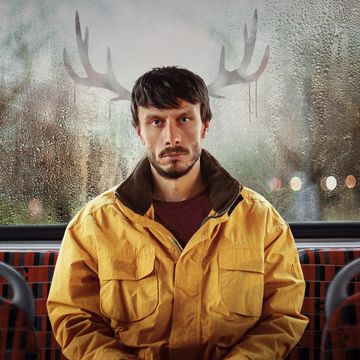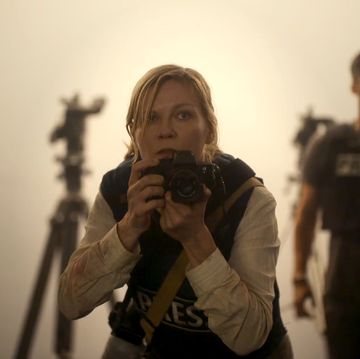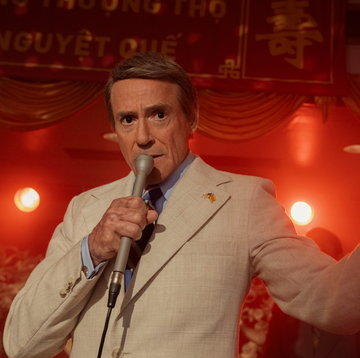Joe Wright's latest film might be called Darkest Hour, but the drama, which follows Winston Churchill during the first days of World War II, is already out in America, and is one of the brightest spots among the scrum of prestige films being released at the end of this year (we'll have to wait until 12 January).
Of course, plenty of that has to do with Wright's buzzed-about cast—an incredible, unrecognisable Gary Oldman as Churchill, Kristin Scott Thomas as his wife, Clementine, and Ben Mendelsohn as King George—but there's no denying that the stylish director (you know him from Atonement and Pride & Prejudice) had more than just great casting working in his favour. Indeed, the dark, moody, thrilling film benefits from extraordinary production and the sort of tight editing that can make you forget that if you've ever read a history book, you already know how this ends.
Here, Wright talks about choosing his subject matter, finding his Churchill, and the pleasures and pains of making a movie about events that changed the world.
Your last film was Pan in 2015. What made you decide to go from Neverland to World War II England?
I knew that I wanted to make a drama next. I was sent the screenplay and found that I was very moved by the story, and there was a lot about it I didn't know. I didn't know about how close we came to utter disaster, and how easily the course of history could've been changed. So I was very excited to discover all that stuff. I was also surprised to realise that there'd never actually been a film about Churchill at the time, you know? Obviously, then as the year progressed, we had another movie about Churchill and Dunkirk happened. It suddenly became the topic that everyone was talking about.
He is everywhere. There's Churchill on The Crown, there are the films; it's like all of a sudden, you can't escape this time period. Is there a lesson from this history that we're desperate to learn now?
Maybe! I don't know what that lesson is and it's not really my job to define that lesson. But I think there are certain questions that we're asking about our contemporary society and political structure—and when we have those questions, I think it's very wise to turn to history and see what it can teach us.
One of the most striking things about Darkest Hour is the mood it sets. Everything is so intricate—from Churchill's home to his offices. How do you go about deciding how to bulid a world like this?
I've worked with my designer Sarah Greenwood for many years, and on every film I've ever done and every TV job I've ever done, apart from one. We have a very close working relationship. It really is about studying material from the period. And also just thinking about the specifics of the story. For instance, it's May 1940 in the film. May was an incredibly hot month that year, and even though we were shooting in, November, December, and January, we created this atmosphere with deep dark shadows, with very hot spots of sunlight.
One of the things that I find really interesting about that period in contrast to today is the kind of make do and mend, as it's called in Britain, this idea that if you have a suit that's wearing thin in the elbows, you sew a patch on it, you don't throw it away and buy a new one. I found that fascinating visually and in terms of the design, and the sets, and the costumes. Churchill was running the biggest war that had ever happened in a basement with maps on the walls, with drawing pins and bits of wool strung between the drawing pins to illustrate the movement of these great armies. I find that kind of homemade quality fascinating, and kind of moving as well.
When it came to casting, how did you come to Gary Oldman? What was going through your mind, like what were you looking for in someone to take on this part?
Casting is kind of 99 percent of the job, really—and with casting, you can either cast someone who looks like how you imagine the character to look, or you can cast someone who has the essence of the character. And I think it's always wise to go with the latter. I had this idea about Churchill, who's generally portrayed as kind of big and slow and lumbering, that he had this incredible dynamic energy.
From every piece of footage I saw of him in action, moving, and certainly from his writing, it seemed to me that he had this intensity of a kinetic intensity, both physically and mentally. So I wanted someone who had that intensity, and as we've seen, you know, over his career, Gary is certainly intense on screen, and so he seemed to have the right essence of the role. Then the challenge became, how do we get him to look something like Churchill, and that was a very practical process of working with this mad scientist of prosthetics guy, and that took about five months to kind of balance and find that right look.
In a story with so many big moments and all of these moving parts, was there anything that was the most daunting for you?
There were these scenes set in the war cabinet room, and the first one was 10 pages of dialogue with 17 men sat around the table. We were in that room for that scene and the subsequent cabinet scenes, so we were in there for two weeks. On the page that doesn't sound particularly cinematic, but I was really excited to try and find a way to create a kind of cinematic tension from those scenes. And so those were the scenes that I was—certainly not dreading, but those were the scenes I was most afraid of and most excited about.
When you do something that's based in history, how much pain do you take to stick exactly to what's in the history books. Because you're going to hear from every armchair expert who'll tell you what you get wrong.
The interesting thing about history is that there are many, many different perspectives of the same events. And so, to a large extent, you have to decide what perspective you're going to take, what's your point of view, and follow that. And so, you read as much as you can, so that you're as informed as possible, and then you have to follow your own gut. And I'm very wary of the notion of goodies and baddies, I think generally people are trying to do their best, especially in a situation like this. So, one tries to see the situation from the different characters' points of view.













